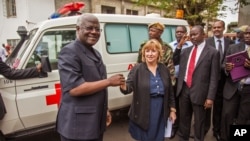Sierra Leone will “close down” the country for three days beginning on Friday as part of the government’s effort to contain and eradicate the deadly Ebola virus infection from exponentially spreading in the West African nation, according to information minister Alpha Kanu.
Current figures show there are 1,400 cases of the Ebola disease in Sierra Leone, according to Kanu.
He said the administration aims to reduce the infection rate.
“Everybody is expected to stay at home except about 50,000 or so essential staff people who will be given passes to move around the country. That does not include the 21,000 youths, who are volunteering to go from house to house to talk to people, [and] educate them about the dangers of the disease, the nature of the disease and how it can be prevented,” said Kanu.
He said the containment measure will focus on suspending the country’s age-old cultural practices, including greetings and funeral arrangements.
“[Volunteers] will talk to them about improving their personal hygiene and also putting in abeyance highly valued cultural activities of touching and feeling each other- shaking hands, hugging and also trying to cut down on our traditional rights of burial, where people have to wash dead bodies before they are buried,” said Kanu.
Kanu said President Ernest Bai Koroma has established two commissions, which he said are being backed by international medical partners, to oversee the Ebola containment measure.
Kanu expressed confidence the measure will succeed.
“We are very encouraged and hopeful that the outcome would be positive in the sense that if you limit the person-to-person contact and the area-to-area movements of people, we can limit the disease and its transmission. Once we do that we cut the transmission rate, we will be in a position to care better for those who are already infected,” he said.
Ebola stigma
Kanu confirmed reports that some citizens infected with the disease have been reluctant to go to medical centers to receive treatment because of the fear of being stigmatized.
“We would be trying to look for any opportunity to bring people out who have already been affected by the disease or identifying people who may be sick and then get them to medical help,” said Kanu. “We want them to know that when they are presented at the hospital at the right time you have a large opportunity that you can survive the virus.”
Some criticism
Critics say the government should have implemented proactive measures more than a month ago to sharply reduce the infection rate. They contend that closing down the country for the containment is a face-saving draconian measure that would hurt only poor people and would harm the economy.
Kanu disagreed, saying the emphasis is on saving lives, and any economic issues can be dealt with later.
“The economy is not the priority at the moment,” said Kanu. “The priority is the health of the nation at the moment. The priority is to cut the transmission so that it does not overwhelm us… that we have a healthy nation so that we can get back to economic development.”





